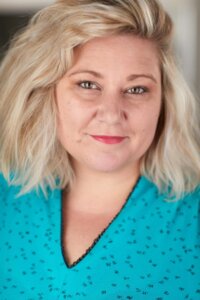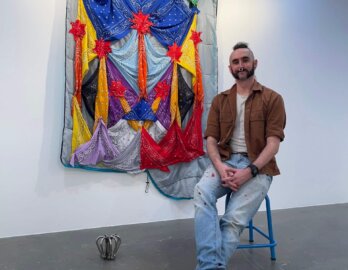SHE (See us, Hear us, Engage with us), is a show about women and mental health. The work has been created by indelabilityarts in collaboration with PIP Theatre and The Good Room
Collated from over 800 real-life survey submissions, SHE is the product of real-life stories – the dark, the neutral, and the light. Meet the writers, creators and performers behind this revealing new theatre work.
SHE
Season: 3 – 13 May 2023
New Benner Theatre, Metro Arts, West Village, West End
AMY INGRAM
Co-creator and co-director
SHE IS EVERYONE
Q1: What is SHE about?
SHE is looking at unpacking mental illness and mental health with females and female-identifying humans.
Q2: How did SHE come together?
indelability (indelabilityarts) approached me last year and asked if I could come on board as a co-creator and bring my back history as a theatre-maker with The Good Room. So, we talked about what the show could be and how we could work together and we got really excited. And we decided to bring on The Good Room submission-based process in order to get content from the general public about their own individual stories and journeys with mental illness and health.
Q3: Why is SHE important?
I think everybody would say that given the last couple of years that mental illness is important, but I think talking about mental illness/mental health is important regardless of the last couple of years. I think that it’s always been a slightly taboo subject, and it’s always been something that if we don’t understand it we push it away or otherwise it. So, I think that this show is important to actually shine a light on, and perhaps bring a little bit more understanding, as to what people are going through in their day-to-day lives.
Q4: Have you learned anything about mental health or people through the submissions?
Probably what I do all the time whenever we do a submission-based process is (realise) just how prevalent something is amongst everybody. There were so many similar stories, and feelings, and journeys, and I think a lot of people probably don’t realise that they aren’t alone in their journey. And I think that was something that was really – in amongst all the heartbreak – quite heartening to read that there are a lot of people out there really slogging it out hard but are together.
Q5: What do you want audiences to take from SHE?
I think, perhaps, just a little more empathy and understanding. I think it is just about broadening the picture. It’s just about going, this lives in our world and probably lives either within you or within someone that you know and we need to be able to talk about it openly, and honestly, and in a way that evokes understanding.
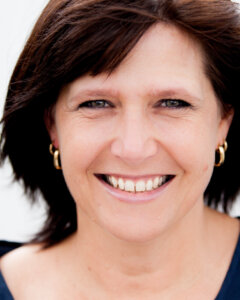
CATARINA HEBBARD
Co-creator and co-director
SHE IS UNAPPOLOGETIC
Q1: What is SHE about?
SHE is basically about women and mental health stories. We are exploring a number of different facets of mental health, so not just going ‘mental health is this’, but we’re exploring the depths of mental health, the surface elements of mental health. That anybody at any time can experience mental health episodes or mental illness, and that it isn’t just associated with one type of person or one demographic.
Q2: Why is SHE important?
What we’re finding through this process is that people need to talk, and this gives a safe space. Some people don’t want to necessarily ‘out’ themselves or seek professional advice, so this is a way for people to hear their stories reflected, to see themselves in other people, to recognize that they’re not alone, to acknowledge that mental health is kind of a pandemic.
Q3: What have you learned through the submissions?
There’s a lot of interesting things that have come out of the submissions. There are a surprising number of people who’ve been through the most horrific experiences, and yet still can see the good in others and still can see light. I think that is just mind blowing when you hear some of the stories and you just think how people are still here. I think that’s so brave, and so incredible, and I can’t wait to share that side of it.
Q4: What do you want the audiences to take from SHE?
I think the biggest thing that we want audiences to take from SHE is that there is always another tomorrow. Like, there is tomorrow if you want it. Tomorrow is always there. It’s sometimes hard to see the future when you’re going through stuff, and I think one of the things that this show is about is day at a time, moment at a time, one step at a time. And I know that sounds really kind of inane or simplified, but in actual fact the majority of people talk of that as being the thing that kind of gets them through – just take it moment by moment and not think too much about what comes next. Just take that next step, take that next breath, keep moving and keep going. You might be able to get through this phase and move into a different phase. I’m not saying that’s going to be perfect ever, but there is tomorrow if you want it.
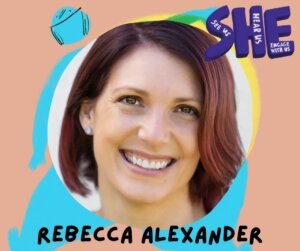
REBECCA ALEXANDER
Co-creator and performer
SHE is formidable
Q1: What is SHE about?
SHE is about mental health in women. We did a big exploration about women and mental health, and exploring different facets of what the female form can go through in life. And just different aspects of what happens to a woman at the highs and our greatest lows.
Q2: How did SHE come together?
First off, we applied for a grant and were successful in getting that. Our aim was to collaborate with different companies. So we wanted to work with Amy Ingram from The Good Room and use The Good Room’s template and marry it with indel’s style of working. And so that was the idea for this show. So that’s what we wanted to do and we got a beautiful team of actors together for our first development session. In that first development phase, what we did was have a huge brainstorming session. We sent out a big survey into the community where anyone was able to give us anonymous stories. And we sent that in, we collated all the stories and all the data we were given, and then we just started to go through everything and see what really popped up, what came out, and what particular stories started to really talk to us as artists – as women. Later on, we had a small showing in December of some of the work we had put together. Then we ended up casting for the show earlier in the year. Now we have three (*four*) beautiful performers that have come on stage, we’ve got Cat and Amy who are co-directing, and a brilliant creative team that have assembled to make what you will see is SHE.
Q3: Why is mental health important?
Mental health in important because it’s something that you or a loved one will experience sometime in your life. It’s inevitable that you will know somebody who is either struggling or has struggled. And so, particularly over the last three years – coming out of the pandemic and covid – it’s just the everyday of being a woman, and recognizing that, and what it is as what we go through as women/people who identify as women. The struggles, the turmoil, the happy places as well. I think we also need to recognize that mental health can also be a state of mind which can be happy also. It’s not always going to be the doom and gloom, and something that we have been really careful to recognize in this show as well. That it’s something that is so prevalent and it’s so important because if we don’t talk about it then nothing’s going to change and nothing’s going to get better.
Q4: What did you learn from the submissions?
One of the best things, or something that I respected that came out of this process, was that people were really open in sharing their stories with us, and sharing to the point of being incredibly vulnerable. And I feel really, really – I’m not sure if lucky is the right word – but I feel very humbled that people were really open in sharing, and sharing their stories with us. I mean, I always knew that most people at some stage would struggle with mental health but it is huge, and it is massive, and I think it kind of demonstrates why doing a show like this incredibly, incredibly important.
Q5: What do you want audiences to take from SHE?
What I want audiences to take from the show is that it’s ok to talk, it’s ok to start asking questions or to recognize that ‘oh hey, I felt like that before’, or ‘I’ve seen someone I care about or I love be like that before’. And know that they’re not alone, and that it’s ok, and that there is help and there is hope. And it’s not always going to be easy but I want people to walk away going ‘I want to talk about it’, and I think if we can create a conversation, and a safe space around it, then that’s how we’re going to start making change.

KAREN LEE ROBERTS
Writer
SHE is evocative
Q1: What has the writing process been like?
The process for writing for SHE has been one of great learning, and an amazing, rewarding process for me. Working with the other writers, all the women in the room, and particularly with Maxine (Mellor), and engaging with her and developing with her as a writer. I have grown so much in my techniques and skills and learned a great deal in the process of writing for the project.
Q2: Why is it important to share your mental health story?
It’s really important to share my story with mental health because I have been through a great deal of struggles in my journey. From when I first began, when I became really unwell with my mental health with my bi-polar and generalized anxiety disorder, to where I am now achieving and doing great things in my career and being relatively stable. I want to share that with people and let them know that they too can beat the odds, and rise above adversity, and live a stable life, and it’s never too late. And you really can live a happy life with a mental illness.
Q3: What do you want the audiences to take from SHE?
I want the audiences to take away something inspiring from SHE. Something that they haven’t thought about before, and maybe something they can relate to in their own journey with mental health or their everyday struggles. I want it to be personable to them, something relatable to them, and also something that they hadn’t thought about. And something that they can put in respect to the wider community of women who are out there struggling everyday with mental health issues, and something that they know in their own circle of people. I want it to be something for everybody.

BIANCA SAEZ
Writer
SHE is change
Q1: How did you become a part of SHE?
How did I become a part of SHE? Well, I’ve lived a big life with severe Tourette syndrome, and gone through really crazy traps, ups and downs. And then, as I’ve gotten older I’m like, ‘ok, why don’t I make my life my business?’ And now I’ve got my very own motivational speaking business called ‘B with Tourettes’. Through that I’ve gotten a job at the Queensland Special Education Leaders. I was educating on Tourettes as a guest speaker on the night. And then Rebecca (who is helping me to be a part of SHE), her husband was one of the principals going, ‘You have to get this lady to come in and do SHE.’ So that’s how I’ve become a part of SHE. Just through life experience, getting somewhere, and then basically coming out the other side and having all of these amazing opportunities. Bring on SHE!
Q2: What has the writing experience for SHE been like?
The writing experience for SHE has been incredible because I’ve gone through all my screwed-up problems before and I’ve kind of come out the other side now. So, it’s incredible to be a part of something amazing to help people with their own mental health and show everyone can go through mental illness and still come out the other side.
Q3: Why is it important to share your story about mental health?
Why it is so important to share about my story and my mental health is because there’s a lot of bad things that happen to people out there and it has to stop. And people need to start standing up, and speaking up, and saying it’s not ok and it needs to stop. Because I believe it’s the only way we can create change.
Q4: What do you want the audiences to take from SHE?
What I want the audience to take away is just to show them they’re not alone. So many people, more than we know (like your boss) could be going through mental health illness and you wouldn’t even know. I’m still on my mental health journey trying to find myself and work out my traumas. And I think me being a part of SHE has really helped me to get there and start thinking in a more positive way how to help myself and get to the problems that I really need to fix in my life.

AURORA LIDDLE-CHRISTIE
Performer
SHE is resilient
Q1: What made you want to be a part of SHE?
I wanted to be a part of SHE because I thought it was going to be a really great space to explore the experiences of women and our mental health, which is not so much talked about publicly, and to shed some light on it. I really thought it would be a great experience to be involves in a process like this.
Q2: Why is mental health important?
Mental health is important because without being grounded mentally, life is crazy and chaotic. I think it is very important at this time because our world and our environment is demanding so much of us, and we need to bring it to the forefront and not distract ourselves from dealing with our health.
Q3: What have you learned from the submissions?
I learned just how many people are going through it, and I think I was reminded of the importance of prioritizing my mental health as well. That’s what it showed me. It showed me that this isn’t something to sweep to the side. You need to look at how you’re feeling, what do you need.
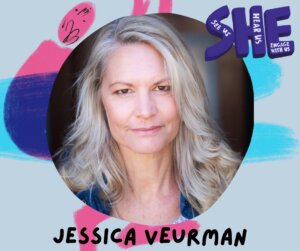
JESSICA VEURMAN
Performer
SHE is fabulous
Q1: What made you want to be a part of SHE?
I absolutely love the whole devising process, so working on the floor and being a part of that creative space was very exciting for me. Plus, I also was really very excited to work with Cat, and Bec, and Amy. Really, that was a big draw card for me.
Q2: What have you learned from the submissions?
I don’t know that it was necessarily something that I learned, but it’s that reaffirming thing that mental health is so prevalent. And it goes from something that’s quite huge and massively impacting someone’s life to smaller things that you face every day – that we all face every day.
Q3: What do you want the audiences to take from SHE?
What the show is trying to do is not to say that we have the fix-all for mental health, but to say that you are not alone. That issues with mental health is something that we all share. And hoping that people will perhaps find a common story or something within the show that says that they’re not alone in their experiences. I think one of the things for people is that they quite often do feel alone. Or they feel like, ‘I’m an idiot’ or ‘I’m stupid’ or ‘why do I feel like this?’ But there are other people out there who share similar stories.
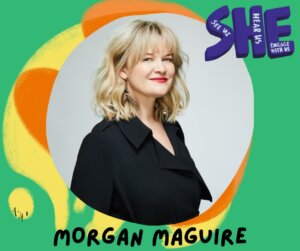
MORGAN MAGUIRE
Performer
SHE is dynamic
Q1: What made you want to be a part of SHE?
Lots of reasons. Firstly, it’s a great crew of humans to be working with which is very exciting. And I think, when you can do theatre with a purpose that really anchors you as an artist. When you can make a difference with people, give voice to people who might historically not have a voice. Also, being able to play a big creative on stage with a bunch of excellent women.
Q2: Why is it important to talk about mental health?
Talking about mental health is really important in order to educate and de-stigmatize mental health/mental illness in the community. I think things are getting better compared to 10-20 years ago. There’s much more language around mental health, but there is still a way to go. So, I think that anything that helps to get rid of any stigma and tell people’s stories and humanize it, is very worthwhile.
Q3: What did you learn from the submissions?
I guess that it doesn’t all fit in one box. There’s many, many, many diverse stories and voices and experiences. And I guess trying to remember than when we think about mental health or mental illness. That it’s not one-size-fits-all, it’s incredibly diverse and varies in terms of peoples’ experience.
Q4: What do you want the audiences to take away from SHE?
I want them to have a visceral experience, to remember the stories, to be moved, to laugh, to be shocked, excited, and understand the diversity of the story that lies beneath mental health and mental illness.

